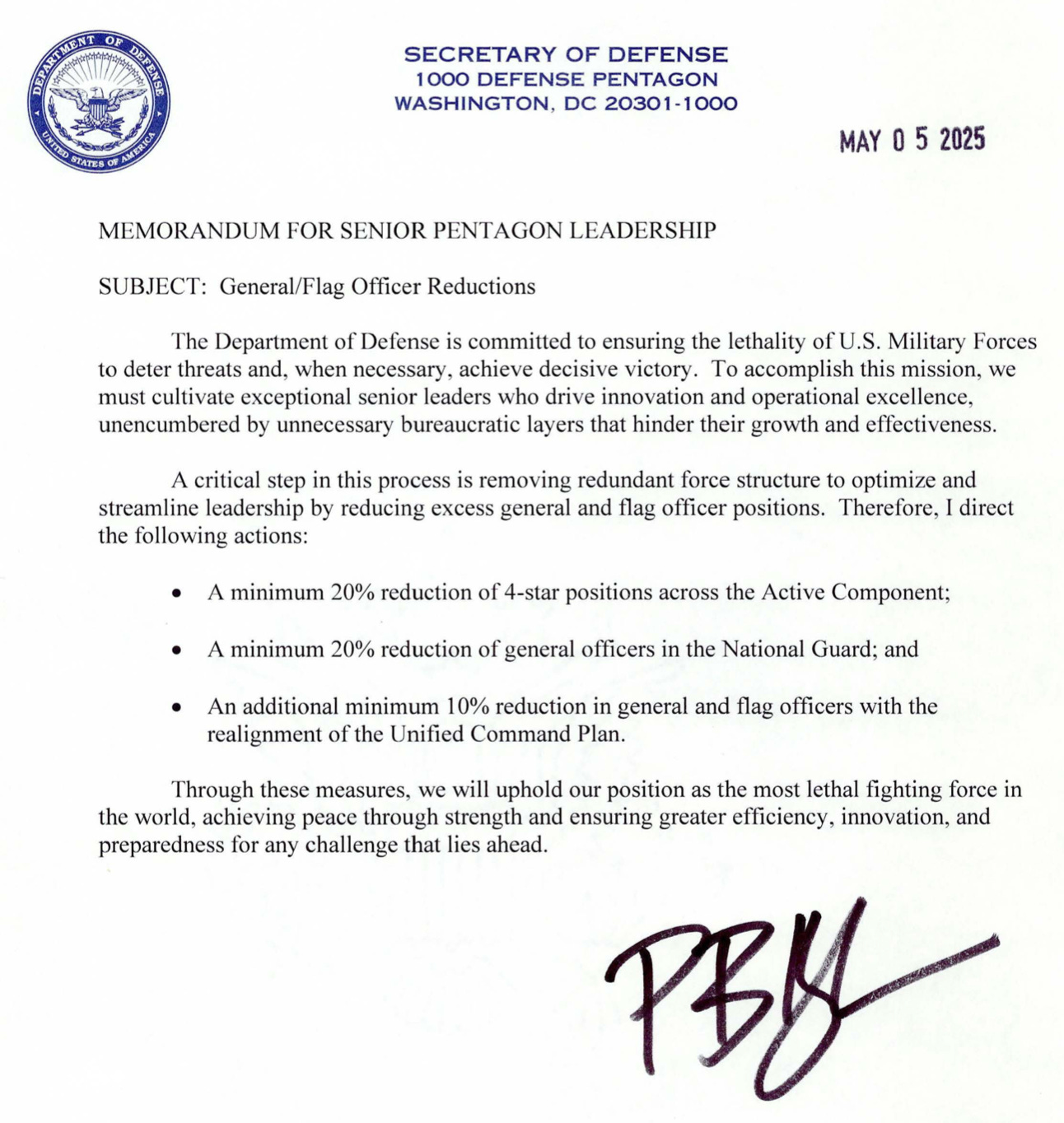Fire the Generals
Civilian control of the military is at stake
Secretary of Defense Pete Hegseth’s order to cut the number of four-star generals and admirals by 20 percent has gotten Washington into another one of its defend-the-system frenzies, mindlessly supporting the military brass.
Hegseth’s belief that the firings will improve the military’s “warfighting capabilities” by rooting out the cabal of Democratic Party ninja operatives is, of course, ridiculous. But this is a classic case of a broken clock being right twice a day. Today’s military brass suck at their jobs. They’re good at agitating for wars (and defending them in jargon-laden testimony to Congress); but ending them? Not so much.
And the military has become politicized, though not how Hegseth thinks. Ever since Bill Clinton chose a number of generals and admirals to populate his administration to bolster his national security “credentials,” presidents from Joe Biden to Donald Trump have reached into the senior ranks for positions that should rightly be held by civilians (like the Secretary of Defense).
It’s difficult to exaggerate the absurd amounts of deference Washington shows the military brass, seeing them in about the same way as the Ancient Greeks saw the deities on Mount Olympus. Consider the meltdown earlier this year over the removal of retired General Mark Milley’s portrait from the Pentagon. Or then-President Biden’s decision to preemptively pardon Milley to shield him from…what, exactly?
With the Ukraine War now in its third year, the war in Gaza not far behind, and the rest of the Middle East still a boiling pot threatening to spill over, the promised deterrence the Pentagon sells (for the low price of $850 billion/year) turns out to be about as legit as Elizabeth Holmes’ needle-free blood test. Uncommon as it is for white collar fraudsters to face consequences for their actions, it does happen sometimes. The same isn’t true of our hallowed military brass.
They bumble from one war to the next like Mr. Magoo, oblivious to the destruction in their wake which they stroll past on their way to corporate board positions and the paid speaking circuit where they make millions in “retirement” for the difficult work of things like telling bankers “thank you for your service,” as Gen. Milley did last year.
This week saw another reminder of their incompetence. Four star Gen. Michael E. Kurilla, head of Central Command, persuaded Trump to undertake a campaign to eliminate Houthi leadership in Yemen, culminating in targeted assassinations modeled off of Israel’s operation against Hezbollah, the New York Times reported. Slated to take 8-10 months, it lasted just days until Trump called it all off after two instances in which $100 million worth of U.S. fighter jets fell into the Red Sea from the USS Harry S. Truman.
Whoops
And it’s not just Kurilla at fault here, but also the dozen generals and admirals in the chain of command between him and the admiral who finally commands the carrier battle group of which the USS Truman is a part. The maintenance workers on the carriers will almost certainly be punished, but will anyone at the higher ranks lose their careers? Not likely.
Meanwhile, top Democrats in Congress are vehemently opposed to the reductions Hegseth is directing.
“I have always advocated for efficiency at the Department of Defense, but tough personnel decisions should be based on facts and analysis, not arbitrary percentages,” said Senator Jack Reed, ranking member of the Senate Armed Services Committee.
Rep. Adam Smith, ranking member of the House Armed Services Committee, took a similar tack, saying “I’m skeptical of Secretary Hegseth’s announcement of sweeping plans to cut military leadership across the Services because it lacks both data-driven analysis and an explanation of the desired end-state.”
“Arbitrary percentages” are exactly how virtually every major company implements layoffs. But for some reason the federal government sees the national security state as a privileged class to be protected from this reality. Why are they so special? Is it because of data-driven justifications of the value of “leadership” or arbitrary sentimentality that salutes without ever asking if it is deserved?
This kind of privileged status is endemic to national security officialdom.
The FBI is facing a budget cut for the first time in years (5%), as I wrote about yesterday, and there too Congress pitched a fit.
“Under your leadership, Director Patel, the FBI has been weaponized to go after Americans who disagree with the president,” Sen. Patty Murray, said before bafflingly warning that “budget cuts will reduce the FBI’s ability to counter threats of terrorism.” You know, “terrorists” like Tesla vandals and the like — the very same groups against whom the FBI has been weaponized.
Better give them more money!
Congress abdicates its oversight responsibilities — profound as they are in the case of the military, which is supposed to be subordinate to civilian government — in part because it faces so little pressure from a public that doesn’t seem to understand what the general and admiral class is.
Think of them as the CEOs of the military. Sure, occasionally a visionary like Steve Jobs comes along. But for the most part they’re empty suits. And when you talk to rank and file service members, they know this. Just about the only people who don’t are officials in Washington, who seem to regard the military brass as patron saints.
The deference is unhealthy. The military is supposed to be a snarling junkyard dog protecting the country. It’s natural that it’s always looking for a fight: it’s supposed to be aggressive! That’s its job. But because of its aggression, it needs to be leashed, with its owner the sole decider of when it’s unleashed. Not the dog.
But as the media sees it, any attempt to yank on the chain to pull the dog back is tantamount to a coup. Story after story casts the Trump administration’s attempts to remove the military brass as “purges” evoking Stalin, as attempts to replace them with dangerous loyalists. In actuality, presidents make their generals and admirals partisan by forcing them to work for their administrations in civilian roles.
And kind of nuance about military leadership, about the role of the military, about the inflation of ranks and about too many commands is almost completely absent from the media coverage of Hegseth’s proposed cutbacks, which has been comically petty about it all.
Take CNN’s interview of retired Maj. Gen. James Marks, opening with Defense Secretary Hegseth’s slogan that he favors “Less generals, more GIs.”
Marks begins by mocking Hegseth’s grammar, snarking that “My English teacher would’ve said minus 0.5, with the ‘less,’” (it’s supposed to be “fewer”).
Who cares!
Marks goes on to say how Hegseth should’ve handled the cuts, saying that he should’ve instead requested “recommendations” from the generals themselves:
“Come back to me with your recommendations. Don't state up front, we got a 20% reduction in four stars, which would be about eight to 10 personnel, and don't say we're gonna have an additional 10% across the board and all the other flags, which would be about an 80 to 90. Number of individuals reduced, come back and say, look, think, here's what we can do to solve this particular problem.
Then if you do that, the service chiefs own the solution. I mean, they're gonna be all in if it's coming from the top. It seems rather, it seems non-serious is what it seems to me. And there's not much, there's not a lot of, um. Real substance to what he's trying to achieve. I think he's flexing his muscles.”
Flexing his muscles? Whether you like Hegseth or not, that’s what the civilian control of the armed forces means. By saying Hegseth must take his cues from the “service chiefs,” Marks is saying that the military — not its civilian leader — should make the call. And lastly, he’s saying the generals themselves should get to decide if they (or their peers) get to keep their jobs.
Hmm, I wonder what they’d say!
“This is not the way you embrace the organization,” Gen. Marks grumbled in closing.
Embrace the organization? Does the General need a hug?
We’ll see if Hegseth is successful, but lucky for Marks, Congress is all for giving him and the entire general class a big warm hug.
— Edited by William M. Arkin




I appreciate how you challenge my assumptions. I often reflexively disagree with you, but you seriously make me question myself. Thank you
I don’t wanna agree with that chudlord about anything but they do need to be slashed. It’s just a revolving door between the pentagon and arms makers. That general staff is like a tumor growing off the main cancer of the military industrial complex